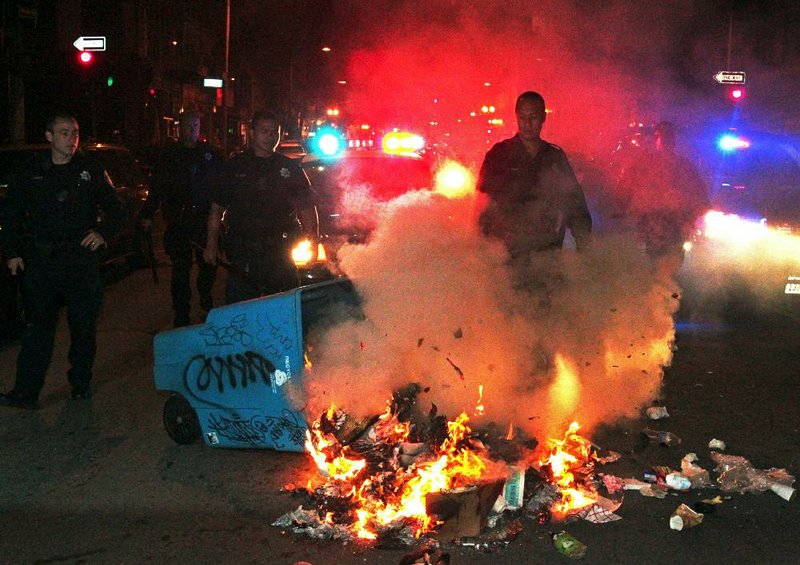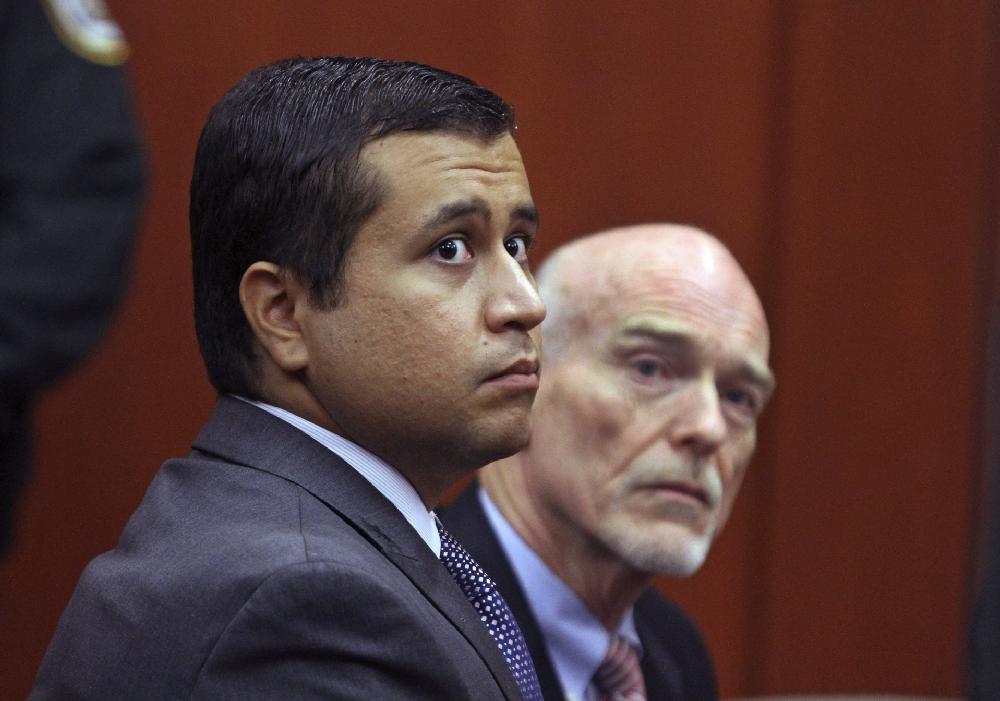SANFORD, Fla. - After a year and a half of living as a hermit, George Zimmerman emerged from a Florida courthouse a free man Saturday, cleared of second-degree murder in the shooting of 17-year-old Trayvon Martin.
His brother, Robert Zimmerman Jr., said Sunday that the former neighborhood-watch volunteer was still processing the reality that he wouldn’t serve prison time for the killing, which George Zimmerman, 29, has maintained was an act of self-defense.
After almost three weeks of testimony, 56 witnesses on both sides and 60 pieces of evidence, the jury deliberated for about 16 hours over two days. Though Zimmerman did not take the stand, it concluded that he rightfully defended himself when he shot Martin in a Sanford townhouse complex on Feb. 26, 2012.
“From a legal perspective, the jury believed that George Zimmerman was justified in using deadly force, that he was in danger of great bodily harm or death in the altercation with Trayvon Martin,” said David Edelstein, a Miami criminal-defense attorney.“They believed he was simply responding with the force necessary to protect himself. They may also have concluded this was a tragic accident.”
However, with many critics angry over his acquittal, Zimmerman’s freedom may be limited. He and his family were said to be in seclusion Sunday out of a fear of retribution.
“He’s going to be looking over his shoulder the rest of his life,” Robert Zimmerman Jr. said during an interview on CNN.
“He’s adjusting,” Robert said of his brother, who has spent much of the past year wearing body armor and disguises on the rare occasions he left his home, whose location was kept secret. “Freedom is kind of a new concept to him. I’d like to see him heal, take some time for himself.”
Martin’s parents, meanwhile, remained in seclusion Sunday, lawyer Benjamin Crump said on morning television. Sybrina Fulton, Martin’s mother, and Tracy Martin, his father, were in the courtroom for much of the trial and testified in the case but did not attend the verdict reading.
“They are still in disbelief about his death and now they are in disbelief about this verdict,” Crump said on ABC’s This Week. “They are trying to make sense of it. They want people to know that they’re going to continue to fight for the legacy of their son, that he had every right to walk home from the 7-Eleven and not expect to be profiled and followed by a strange man.”
Demonstrators upset with the verdict protested mostly peacefully in Florida; Milwaukee; Atlanta; Washington, D.C., and other places overnight Saturday and into the early morning Sunday.
In Oakland, Calif., some angry demonstrators broke windows, burned U.S. flags and started street fires. Some marchers also vandalized a police squad car and used spray paint to scrawl anti-police graffiti on roads and Alameda County’s Davidson courthouse. In Los Angeles, police said a crowd of about 100 protesters surrounded an officer and two people threw bottles when more police arrived. The officers used beanbag rounds to disperse the crowd.
About 200 people turned out for a rally and march in downtown Chicago on Sunday, saying the verdict was symbolic of lingering racial divisions in the United States.
Maya Miller, 73, said the case reminded her of the 1955 slaying of Emmett Till, a black 14-year-old from Chicago who was murdered by a group of white men while visiting Mississippi. Till’s killing galvanized the civil-rights movement.
Miller said she felt as if “nothing has changed in 58 years.”
Churches also made note of the verdict Sunday morning, with many leaders speaking about the case and urging peace in the aftermath. Some congregants wore hooded sweatshirts, such as Martin had on when he died, or shirts with the teen’s picture.
Martin’s killing in February 2012 unleashed debate across the U.S. over racial profiling, self-defense and equal justice. Protesters nationwide lashed out against police in the Orlando suburb of Sanford as it took 44 days for Zimmerman to be arrested. Many, including Martin’s parents, said Zimmerman had racially profiled the unarmed black teen. Zimmerman’s mother is Hispanic, his father white.
Six anonymous female jurors considered the often conflicting testimony over who was the aggressor on the rainy night the 17-year-old was shot while walking through the gated townhouse community where he was staying and where Zimmerman lived.
The court did not release the racial and ethnic makeup of the jury, but the panel appeared to reporters covering selection to be made up of five white women and a sixth woman who may be Hispanic.
In August 2012, defense attorney Mark O’Mara said Zimmerman and his wife, Shellie, had been living like hermits and weren’t working because they feared for their safety.
While defense attorneys said they were thrilled with the outcome, O’Mara suggested Zimmerman’s safety would be an ongoing concern.
“There still is a fringe element that wants revenge,” O’Mara said. “They won’t listen to a verdict of not guilty.”
Those watching reacted strongly when the verdict was announced. Supporters of Martin’s family who had gathered outside the courtroom yelled “No! No!” upon learning of the verdict.
Andrew Perkins, 55, a black resident of Sanford, angrily asked outside the courthouse: “How the hell did they find him not guilty?”
“He killed somebody and got away with murder,” Perkins shouted, so angry he shook, looking toward the courthouse.
Trayvon Martin’s brother, Jahvaris Fulton, said on Twitter: “Et tu America?” - a reference to the Latin phrase “Et tu, Brute?” known as an expression of betrayal.
In a Sunday afternoon statement, President Barack Obama called Martin’s death a tragedy for America but asked that Americans respect calls for calm reflection.
“I know this case has elicited strong passions,” he said. “And in the wake of the verdict, I know those passions may be running even higher. But we are a nation of laws, and a jury has spoken.”
The statement reflected the widespread national attention of the case. The White House rarely issues formal responses to trials that do not directly involve the president or federal government.
The NAACP is pushing U.S. Attorney General Eric Holder to pursue a hate-crimes case against Zimmerman, its leader said Sunday on CNN’s State of the Union.
“There is reason to be concerned that race was a factor in why he targeted young Trayvon” said Ben Jealous, the NAACP president. “We know there will be a state phase, there will be a civil phase almost assuredly, and then there will be a civil-rights phase,” he said.
The Justice Department said Sunday that it is looking into the shooting death of Martin to determine whether federal prosecutors will file criminal civil-rights charges now that Zimmerman has been acquitted in the state case.
The department opened an investigation into Martin’s death last year but stepped aside to allow the state prosecution to proceed.
Crump said Martin’s parents would investigate filing a lawsuit outside Sanford, where the criminal trial was held.
In a wrongful-death action against Zimmerman, Martin’s family would need to show he was culpable only by a preponderance of the evidence, according to Peter Grenier, a personal injury lawyer at Bode & Grenier LLP in Washington. The criminal case and acquittal, decided on the standard of beyond-a-reasonable-doubt, would be irrelevant to the civil suit under Florida law, Grenier said.
O.J. Simpson, the ex-football player who was acquitted of murder in the stabbing deaths of his ex-wife, Nicole Brown Simpson, and Ron Goldman, was ordered to pay $33.5 million after losing a wrongful-death trial.
Martin’s family maintained the teen was not the aggressor, and prosecutors suggested Martin was scared because he was being followed by a stranger. Defense attorneys, however, said Martin knocked Zimmerman down and was slamming the older man’s head against the concrete sidewalk when Zimmerman fired his gun.
Prosecutors called Zimmerman a liar and portrayed him as a “wannabe cop” vigilante who had grown frustrated by break-ins in his neighborhood committed primarily by young black men. Zimmerman assumed Martin was up to no good and took the law into his own hands, prosecutors said.
State Attorney Angela Corey said after the verdict that she believed second-degree murder was the appropriate charge because Zimmerman’s mindset “fit the bill of second-degree murder.”
“We charged what we believed we could prove,” Corey said.
Despite the racially charged nature of the case, race was barely mentioned at the trial.
“This case has never been about race or the right to bear arms,” Corey said. “We believe this case all along was about boundaries, and George Zimmerman exceeded those boundaries.”
One of the few mentions of race came from witness Rachel Jeantel, the Miami teen who was talking to Martin by phone moments before he was shot. She testified that he described being followed by a “creepy-ass cracker” as he walked through the neighborhood.
Jeantel gave some of the trial’s most riveting testimony. She said she overheard Martin demand, “What are you following me for?” and then yell, “Get off! Get off!” before his cellphone went dead.
Information for this article was contributed by Kyle Hightower, Mike Schneider, Tamara Lush, Kelli Kennedy, Suzette Laboy, David Fischer, Julie Pace, Eric Tucker, Pete Yost and Verena Dobnik of The Associated Press; by Tom Schoenberg, Andrew Zajac, Kathleen Miller, Phil Mattingly, Kasia Klimasinska and Christopher Boyd of Bloomberg News; by Michael Muskal and Molly Hennessy-Fiske of the Los Angeles Times; and by Audra D.S. Burch, Evan S. Benn and David Ovalle of The Miami Herald.
Front Section, Pages 1 on 07/15/2013

